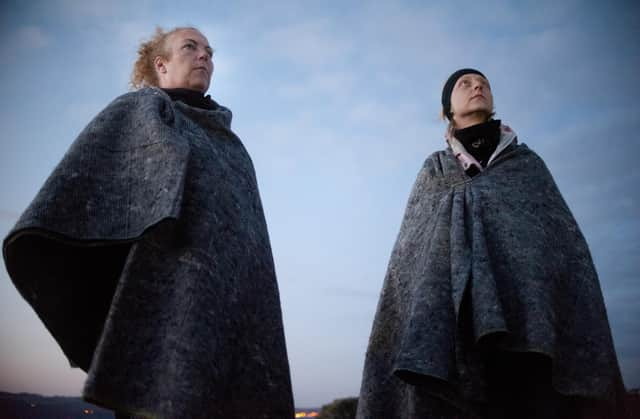Readers' Letters: Scotland staying in UK means best of both worlds


Across the whole island we share a common language and a common culture, watching the same TV programmes, listening to the same popular music, enjoying the same sports and facing the same economic problems as we try to maintain our public services and standard of living.Those seem to me to be pretty good reasons for staying together and working together to improve our democracy and our economy.
Of course there is a distinctive Scottish culture as well as the culture we share. That's true of every region of the UK. There is a variety of accents and traditions which mark out differences of historical background. When I was young I was fully aware of the Scottishness of Oor Wullie, The Broons, Andy Stewart, Rabbie Burns, ceilidh dancing and Hogmanay, and I enjoyed it all. But I was also aware of Dan Dare, Norman Wisdom, Wordsworth, Dickens, Shakespeare and rock 'n roll, and I enjoyed that other culture too. If anyone had suggested I should choose one culture or the other I would have thought they were crazy – why should I be restricted to one culture when I enjoyed both life?
Advertisement
Hide AdAdvertisement
Hide AdIt is many decades since my childhood, but, if anything, the passing of the years has only emphasised how important our common culture is. The most popular programmes on TV are not found on the Alba channel. They are soaps, quizzes, comedies, dramas, science and history documentaries which are made for the whole UK. Programmes made elsewhere also feature, but the vast majority arise out of our shared common culture here. We should treasure that culture because it has enriched our lives so much. I hope the day never dawns when narrow-minded bigotry triumphs and we shut ourselves off from our shared island heritage.
Les Reid, Edinburgh
Youthful minds
Double-think is the ability to believe two contradictory statements simultaneously. This occurs in Joyce McMillan’s interpretation of some very real threats to democracy (Perspective, 29 December).
Not content with demonising many of our senior citizens for being more likely to vote Conservative, she shares the pearl-clutching statistic that “a frightening 42 per cent of young people worldwide thought that military rule or a strong leader without checks and balances would be the best way to run a country”.
But we’re also informed that 18 to 24-year-olds “care more about the environment and climate change than older voters… are more outraged by glaring international abuses of human rights… are enraged by an economy blighted by a combination of grotesque housing costs and insecure junk jobs.”
Global youth: a bunch of juvenile fascists, or latter-day flower children clamouring for the far-left to solve their problems? You can’t have it both ways.
Ms McMillan continues: “Older generations who have made such a mess of our world can no longer be trusted to reject the snake-oil remedies of the xenophobic far-right.” That’s rich coming from someone who still believes in Continuity SNP/Green miracle cures, now being rapidly exposed for the simplistic drivel they always were.
Must the franchise therefore be removed from anyone over a certain age, lest they vote the wrong way? That doesn’t sound very democratic, somehow. Ms McMillan is rightly concerned about declining youth engagement with politics, “despite some good work on the inclusion of young people in Scotland”. Alex Salmond gave 16 and 17-year-olds the vote in a cynical attempt to swing the 2014 referendum his way. He miscalculated, so now there’s even talk among separatists of giving votes to children aged 15; about as democratically legitimate as pretending that an election is a de facto referendum.
Martin O’Gorman, Edinburgh
Ban fireworks
Fireworks, of which we saw many over New Year, emit a large amount of greenhouse gas after an explosion. They propel a cocktail of chemicals into the atmosphere, many of which harm both people and the environment. The poisonous particles and dust spread on the wind to reach animals and people who are not even near a fireworks event. There is also the risk of animals ingesting the particles and parts of fireworks. The noise terrorises many of us as well as wildlife and our pets.
Advertisement
Hide AdAdvertisement
Hide AdWe are told that there is a climate emergency and a biodiversity crisis, in which case there is obviously no place for fireworks in today’s society – so why haven't they been banned?
The lunatics, namely our SNP/Green Government, are running the asylum.
Aileen Jackson, Uplawmoor East Renfrewshire
Trunk call
Every year we read about unfortunate people left without electricity due to power lines being brought down by trees. The answer is very obvious, at least to me.
Cut down all the trees within range of possible damage to the power lines. This may be expensive initially, to the suppliers, but would be well worth it to their suffering customers, and would probably save money in the longer term.
Bill McKenzie, Penicuik, Midlothian
Time costs
I wonder if any other readers were as bemused as I was by J Lindsay Walls (Letters, 30 December) in which they attempted to give us a better understanding of what vast sums of money, such as millions and billions of pounds, actually represent, by substituting £1 for a second of time.
I was so confused I had to lie down in a darkened room for £7,200.
John Wann, Edinburgh
Write to The Scotsman
We welcome your thoughts – no letters submitted elsewhere, please. Write to [email protected] including name, address and phone number – we won't print full details. Keep letters under 300 words, with no attachments, and avoid 'Letters to the Editor/Readers’ Letters' or similar in your subject line – be specific. If referring to an article, include date, page number and heading.
Comments
Want to join the conversation? Please or to comment on this article.